2011届江西南昌一中、十中英语联考
江西省南昌市高三英语11月联考试题新人教版
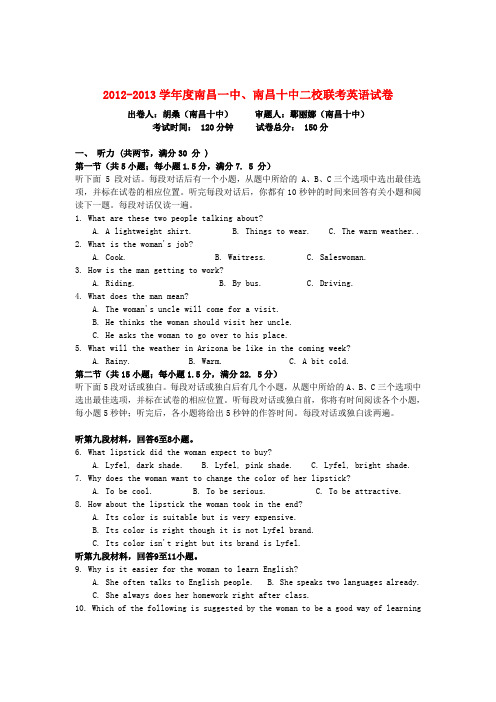
2012-2013学年度南昌一中、南昌十中二校联考英语试卷出卷人:胡桑(南昌十中)审题人:鄢丽娜(南昌十中)考试时间: 120分钟试卷总分: 150分一、听力 (共两节,满分30 分 )第一节(共5小题;每小题1.5分,满分7. 5 分)听下面 5 段对话。
每段对话后有一个小题,从题中所给的 A、B、C三个选项中选出最佳选项,并标在试卷的相应位置。
听完每段对话后,你都有10秒钟的时间来回答有关小题和阅读下一题。
每段对话仅读一遍。
1. What are these two people talking about?A. A lightweight shirt.B. Things to wear.C. The warm weather..2. What is the woman's job?A. Cook.B. Waitress.C. Saleswoman.3. How is the man getting to work?A. Riding.B. By bus.C. Driving.4. What does the man mean?A. The woman's uncle will come for a visit.B. He thinks the woman should visit her uncle.C. He asks the woman to go over to his place.5. What will the weather in Arizona be like in the coming week?A. Rainy.B. Warm.C. A bit cold.第二节(共15小题;每小题1.5分,满分22. 5分)听下面5段对话或独白。
每段对话或独白后有几个小题,从题中所给的A、B、C三个选项中选出最佳选项,并标在试卷的相应位置。
听每段对话或独白前,你将有时间阅读各个小题,每小题5秒钟;听完后,各小题将给出5秒钟的作答时间。
江西省南昌一中、南昌十中2010届高三12月联考
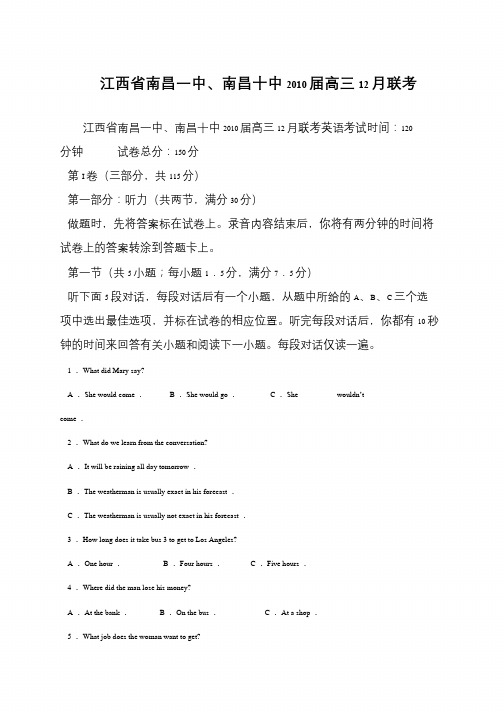
江西省南昌一中、南昌十中2010 届高三12 月联考江西省南昌一中、南昌十中2010 届高三12 月联考英语考试时间:120分钟试卷总分:150 分第I 卷(三部分,共115 分)第一部分:听力(共两节,满分30 分)做题时,先将答案标在试卷上。
录音内容结束后,你将有两分钟的时间将试卷上的答案转涂到答题卡上。
第一节(共5 小题;每小题1.5 分,满分7.5 分)听下面5 段对话,每段对话后有一个小题,从题中所给的A、B、C 三个选项中选出最佳选项,并标在试卷的相应位置。
听完每段对话后,你都有10 秒钟的时间来回答有关小题和阅读下一小题。
每段对话仅读一遍。
1.What did Mary say?A.She would come.B.She would go.C.She wouldn’t come.2.What do we learn from the conversation?A.It will be raining all day tomorrow.B.The weatherman is usually exact in his forecast.C.The weatherman is usually not exact in his forecast.3.How long does it take bus 3 to get to Los Angeles?A.One hour.B.Four hours.C.Five hours.4.Where did the man lose his money?A.At the bank.B.On the bus.C.At a shop.5.What job does the woman want to get?。
江西省南昌市三校(一中、十中、铁一中)2022-2023学年高三上学期11月期中联考《英语》含答案

南昌市三校(一中、十中、铁一中)高三上学期第一次联考英语试题命题:铁一中高三英语备课组考试时长:120分钟试卷总分:150分第一部分听力(共两节,满分30分)第一节(共5小题; 每小题1.5分,满分7.5分)听下面5段对话。
每段对话后有一个小题,从题中所给的A、B、C三个选项中选出最佳选项。
听完每段对话后,你都有10秒钟的时间来回答有关小题和阅读下一小题。
每段对话仅读一遍。
1. What kind of life is the man expecting this weekend?A. A busy one.B. A colorful one.C. A relaxing one.2. Where does the conversation probably take place?A. In a restaurant.B. In a clothing shop.C. In the woman's house.3. What is the woman worried about?A. She won't go back until midnight.B. Her son might be caught in the storm.C. Her friend can’t receive her message.4. What does the man suggest the woman do?A. Balance study and voluntary work.B. Work at the community part-time.C. Stick to her weekly schedule.5. When did the woman get off work yesterday?A. At 6:00 pm.B. At 8:00 pm.C. At 9:00 pm.第二节(共15小题;每小题1.5分,满分22.5分)听下面5段对话或独白。
南昌市2011英语答案
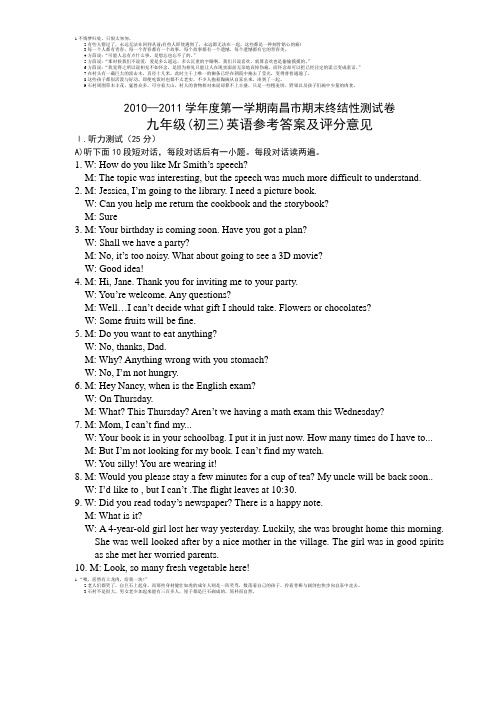
5.方茴说:“那时候我们不说爱,爱是多么遥远、多么沉重的字眼啊。
我们只说喜欢,就算喜欢也是偷偷摸摸的。
”6.方茴说:“我觉得之所以说相见不如怀念,是因为相见只能让人在现实面前无奈地哀悼伤痛,而怀念却可以把已经注定的谎言变成童话。
”7.在村头有一截巨大的雷击木,直径十几米,此时主干上唯一的柳条已经在朝霞中掩去了莹光,变得普普通通了。
8.这些孩子都很活泼与好动,即便吃饭时也都不太老实,不少人抱着陶碗从自家出来,凑到了一起。
9.石村周围草木丰茂,猛兽众多,可守着大山,村人的食物相对来说却算不上丰盛,只是一些粗麦饼、野果以及孩子们碗中少量的肉食。
2010—2011学年度第一学期南昌市期末终结性测试卷九年级(初三)英语参考答案及评分意见Ⅰ.听力测试(25分)A)听下面10段短对话,每段对话后有一小题。
每段对话读两遍。
1. W: How do you like Mr Smith’s speech?M: The topic was interesting, but the speech was much more difficult to understand.2. M: Jessica, I’m going to the library. I need a picture book.W: Can you help me return the cookbook and the storybook?M: Sure3. M: Your birthday is coming soon. Have you got a plan?W: Shall we have a party?M: No, it’s too noisy. What about going to see a 3D movie?W: Good idea!4. M: Hi, Jane. Thank you for inviting me to your party.W: You’re welcome. Any questions?M: Well…I can’t decide what gift I should take. Flowers or chocolates?W: Some fruits will be fine.5. M: Do you want to eat anything?W: No, thanks, Dad.M: Why? Anything wrong with you stomach?W: No, I’m not hungry.6. M: Hey Nancy, when is the English exam?W: On Thursday.M: What? This Thursday? Aren’t we having a math exam this Wednesday?7. M: Mom, I can’t find my...W: Your book is in your schoolbag. I put it in just now. How many times do I have to... M: But I’m not looking for my book. I can’t find my watch.W: You silly! You are wearing it!8. M: Would you please stay a few minutes for a cup of tea? My uncle will be back soon.. W: I’d like to , but I can’t .The flight leaves at 10:30.9. W: Did you read today’s newspaper? There is a happy note.M: What is it?W: A 4-year-old girl lost her way yesterday. Luckily, she was brought home this morning.She was well looked after by a nice mother in the village. The girl was in good spirits as she met her worried parents.10. M: Look, so many fresh vegetable here!1.“噢,居然有土龙肉,给我一块!”2.老人们都笑了,自巨石上起身。
江西省九校2011届高三年级联合考试英语试题

分宜中学玉山一中临川一中2011年江西省高三联合考试南城一中南康一中高安中学彭泽一中泰和中学樟树中学英语试题本试卷分为第Ⅰ卷(选择题)和第Ⅱ卷(非选择题)两部分,共150分,考试时间120分钟。
第I卷第一部分:听力(共两节,满分30分)第一节(共5小题;每小题1.5分,满分7.5分)听下面5段对话。
每段对话后有一个小题,从题中所给的A、B、C三个选项中选出最佳选项,并标在试卷的相应位置。
听完每段对话后,你都有10秒钟的时间来回答有关小题和阅读下一小题。
每段对话仅读一遍。
1.Does the woman like her life in England?A.Yes, she does. B.No, she doesn’t. C.We don’t know.2.Where does the conversation most probably take place?A.In a garage. B.In a motel. C.In a shop.3.What does the man ask the woman to do?A.He asks the woman to have change for a note.B.He asks the woman to allow him to use her telephone.C.He asks the woman to give him some money.4.What’s the woman?A.She is a cashier. B.She is a policewoman. C.She is an accountant. 5.According to the conversation, what is the book about?A.It is about building bridges.B.It is about hot cakes.C.It is a best seller.第二节(共15小题;每题1.5分,满分22.5分)听下面5段对话或独白。
江西省南昌一中、南昌十中高三第三次联考(语文).doc
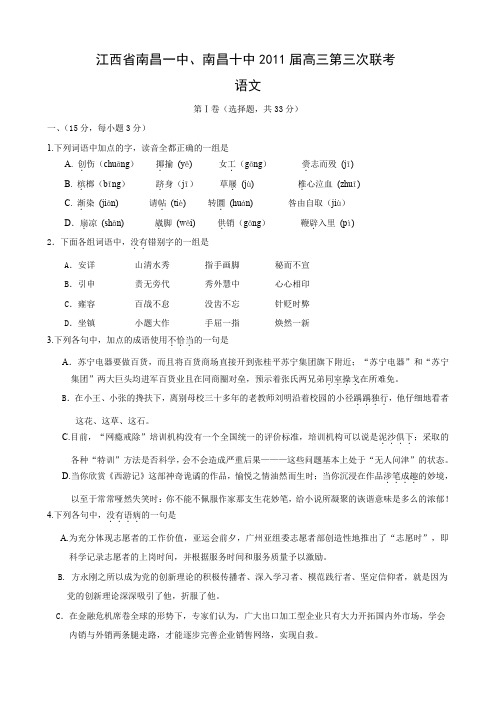
江西省南昌一中、南昌十中2011届高三第三次联考语文第Ⅰ卷(选择题,共33分)一、(15分,每小题3分)1.下列词语中加点的字,读音全都正确的一组是A. 创.伤(chuāng)揶.揄(yē)女工.(gōng)赍.志而殁(jī)B. 槟.榔(bīng)跻.身(jī)草屦.(jù) 椎.心泣血(zhuī)C. 渐.染(jiān) 请帖.(tiè) 转圜.(huán) 咎由自取(jiù)D.扇.凉(shān) 崴.脚(wēi) 供.销(gōng)鞭辟.入里(pì)2.下面各组词语中,没有..错别字的一组是A.安详山清水秀指手画脚秘而不宣B.引申责无旁代秀外慧中心心相印C.雍容百战不怠没齿不忘针贬时弊D.坐镇小题大作手屈一指焕然一新3.下列各句中,加点的成语使用不恰当...的一句是A.苏宁电器要做百货,而且将百货商场直接开到张桂平苏宁集团旗下附近;“苏宁电器”和“苏宁集团”两大巨头均进军百货业且在同商圈对垒,预示着张氏两兄弟同室操戈....在所难免。
B.在小王、小张的搀扶下,离别母校三十多年的老教师刘明沿着校园的小径踽踽独行....,他仔细地看者这花、这草、这石。
C.目前,“网瘾戒除”培训机构没有一个全国统一的评价标准,培训机构可以说是泥沙俱下....;采取的各种“特训”方法是否科学,会不会造成严重后果———这些问题基本上处于“无人问津”的状态。
D.当你欣赏《西游记》这部神奇诡谲的作品,愉悦之情油然而生时;当你沉浸在作品涉笔成趣....的妙境,以至于常常哑然失笑时:你不能不佩服作家那支生花妙笔,给小说所凝聚的诙谐意味是多么的浓郁!4.下列各句中,没有语病....的一句是A.为充分体现志愿者的工作价值,亚运会前夕,广州亚组委志愿者部创造性地推出了“志愿时”,即科学记录志愿者的上岗时间,并根据服务时间和服务质量予以激励。
B. 方永刚之所以成为党的创新理论的积极传播者、深入学习者、模范践行者、坚定信仰者,就是因为党的创新理论深深吸引了他,折服了他。
南昌市2011年初中毕业暨中等学校招生考试英语
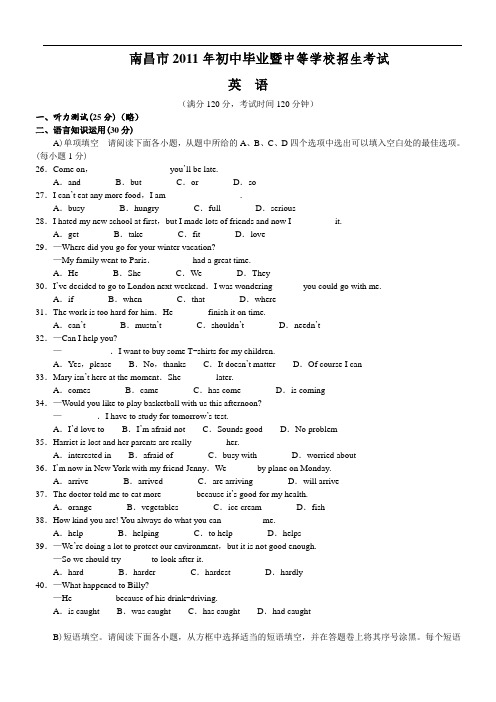
南昌市2011年初中毕业暨中等学校招生考试英语(满分120分,考试时间120分钟)一、听力测试(25分)(略)二、语言知识运用(30分)A)单项填空请阅读下面各小题,从题中所给的A、B、C、D四个选项中选出可以填入空白处的最佳选项。
(每小题1分)26.Come on,_________________ you’ll be late.A.and B.but C.or D.so27.I can’t eat any more food,I am_________________.A.busy B.hungry C.full D.serious28.I hated my new school at first,but I made lots of friends and now I _________ it.A.get B.take C.fit D.love29.—Where did you go for your winter vacation?—My family went to Paris.________ had a great time.A.He B.She C.We D.They30.I’ve decided to go to London next weekend.I was wondering ______ you could go with me.A.if B.when C.that D.where31.The work is too hard for him.He _______ finish it on time.A.can’t B.mustn’t C.shouldn’t D.needn’t32.—Can I help you?—___________.I want to buy some T-shirts for my children.A.Yes,please B.No,thanks C.It doesn’t matter D.Of course I can33.Mary isn’t here at the moment.She _______ later.A.comes B.came C.has come D.is coming34.—Would you like to play basketball with us this afternoon?—________.I have to study for tomorrow’s test.A.I’d love to B.I’m afraid not C.Sounds good D.No problem35.Harriet is lost and her parents are really _______ her.A.interested in B.afraid of C.busy with D.worried about36.I’m now in New York with my friend Jenny.We ______ by plane on Monday.A.arrive B.arrived C.are arriving D.will arrive37.The doctor told me to eat more _______ because it’s good for my health.A.orange B.vegetables C.ice cream D.fish38.How kind you are! You always do what you can_________ me.A.help B.helping C.to help D.helps39.—We’re doing a lot to protect our environment,but it is not good enough.—So we should try ______ to look after it.A.hard B.harder C.hardest D.hardly40.—What happened to Billy?—He _________ because of his drink-driving.A.is caught B.was caught C.has caught D.had caughtB)短语填空。
江西重点中学盟校2011届高三第二次联考英语试题及答案
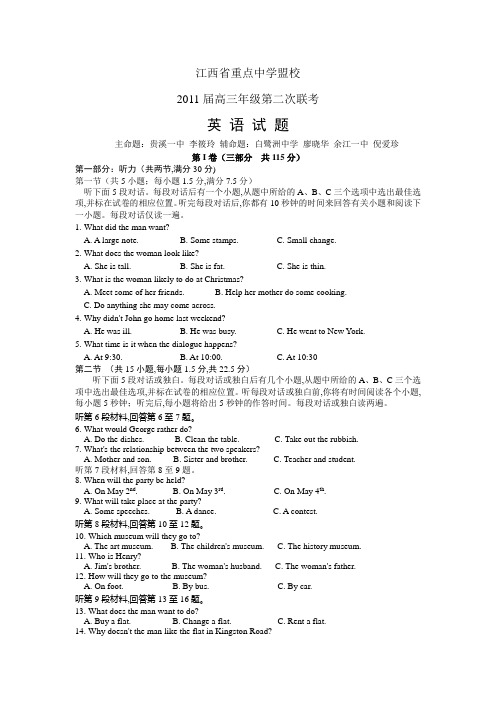
江西省重点中学盟校2011届高三年级第二次联考英语试题主命题:贵溪一中李筱玲辅命题:白鹭洲中学廖晓华余江一中倪爱珍第I卷(三部分共115分)第一部分:听力(共两节,满分30分)第一节(共5小题;每小题1.5分,满分7.5分)听下面5段对话。
每段对话后有一个小题,从题中所给的A、B、C三个选项中选出最佳选项,并标在试卷的相应位置。
听完每段对话后,你都有10秒钟的时间来回答有关小题和阅读下一小题。
每段对话仅读一遍。
1.What did the man want?A. A large note.B. Some stamps.C. Small change.2.What does the woman look like?A. She is tall.B. She is fat.C. She is thin.3.What is the woman likely to do at Christmas?A. Meet some of her friends.B. Help her mother do some cooking.C. Do anything she may come across.4.Why didn't John go home last weekend?A. He was ill.B. He was busy.C. He went to New York.5.What time is it when the dialogue happens?A. At 9:30.B. At 10:00.C. At 10:30第二节(共15小题,每小题1.5分,共22.5分)听下面5段对话或独白。
每段对话或独白后有几个小题,从题中所给的A、B、C三个选项中选出最佳选项,并标在试卷的相应位置。
听每段对话或独白前,你将有时间阅读各个小题,每小题5秒钟;听完后,每小题将给出5秒钟的作答时间。
每段对话或独白读两遍。
- 1、下载文档前请自行甄别文档内容的完整性,平台不提供额外的编辑、内容补充、找答案等附加服务。
- 2、"仅部分预览"的文档,不可在线预览部分如存在完整性等问题,可反馈申请退款(可完整预览的文档不适用该条件!)。
- 3、如文档侵犯您的权益,请联系客服反馈,我们会尽快为您处理(人工客服工作时间:9:00-18:30)。
南昌一中、南昌十中2011届高三联合考试英语试题考试时间:120分钟试卷总分:150分一、听力第一节(共5小题,每小题1.5分,满分7.5分)听下面5段对话,每段对话后有一个小题,从题中所给的A、B、C三个选项中选出最佳选项,并标在试卷相应位置。
听完每段对话后,你都有10秒钟的时间来回答有关小题和阅读下一小题。
每段对话仅读一遍。
1.How does the woman feel?A.Unhappy.B.Tired.C.Hungry.2.What will the man probably buy?A.A sweater.B.A radio.C.A skirt.3.What will the man do if the woman calls for help about her computer?A.He will help her and charge.B.He will help her for free.C.He won’t help her.4.Who drew the picture?A.May.B.Bob.C.John.5.What’s the birthday present?A.A book.B.A recorder.C.A pen.第二节(共15小题,每小题1.5分,满分22.5分)听下面5段对话或独白。
每段对话或独白后有几个小题,从题中所给的A、B、C三个选项中选出最佳选项,并标在试卷的相应位置。
听每段对话或独白前,你将有时间阅读各个小题,每小题5秒钟;听完后,各小题将给出5秒钟的作答时间。
每段对话或独白读两遍。
听第6段材料,回答第6至8题。
6.What’s Mary’s problem?A.Her television doesn’t work.B.Her radio is broken.C.She can’t play tennis.7.Who finally solved the problem?A.John.B.Mary.C.The repairman.8.What are the speakers going to do?A.To play tennis.B.To go to the town.C.To stay at home.听第7段材料,回答第9至11题。
9.Where does the conversation take place?A.At home.B.In Italy.C.In the office.10.What did the man do before he came back?A.He took a photo with the woman.B.He wrote to the woman.C.He learned Italian.11.What was the best part of the man’s trip?A.Being with his grandmother.B.Being with his relatives in Italy.C.Speaking Italian with his relatives.听第8段材料,回答第12至14题。
12.What did dinosaurs live on?A.Plants or meat.B.Beasts.C.Birds.13.What animal could fly like birds?A.Dinosaurs.B.Fish.C.Some Lizards (蜥蜴).14.Which kinds of animals laid eggs according to the conversation?A.Lizards and fish.B.Dinosaurs and lizards.C.Dinosaurs and fish.听第9段材料,回答第15至17题。
15.What kind of school does the man like?A.A mixed school.B.A boarding school.C.A single sex school.16.How many siblings (兄弟姐妹) does the man have at home?A.One.B.Two.C.None.17.What does the man think of the state schools in his town?A.They are expensive.B.They are terrible.C.They are strict.听第10段材料,回答第18至20题。
18.What is Mr.Zhai?A.A pilot.B.Mission leader.C.A scientist.19.How much did Mr.Zhai’s spacesuit cost?A.20 million pounds.B.200 million pounds.C.220 million pounds.20.Why are the Chinese the leaders in the Asian space race?A.Because of their abundant investment.B.Because of their full service capability.C.Because of their advanced science and technology.二、单项填空(15小题,每小题1分,满分15分)21.The teacher dismissed his students with ____ wave of ____ hand a second before the bell rang.A.a; 不填B.the; a C.a; the D.a; a22.Schools that serve healthier foods, offer nutrition education and reward students for nutritious eating habits can make a major ____ in preventing childhood obesity [肥胖].A.mistake B.sense C.impression D.difference23.____ else does this kind of forest exist in the world.A.Anywhere B.Somewhere C.Everywhere D.Nowhere24.Kitty’s life was ____ normal, and as an athlete, Kitty was far above average.When she gave up diving, she wanted danger and adventure.A.nothing but B.all but C.anything but D.everything but25.A recent survey shows ____ great social changes, traditional values like family harmony still play an important role in Chinese people in heart.A.in spite of B.in charge ofC.as a consequence of D.in return for26.I didn’t like her at first, but in the end I ____ got quite fond of her.A.exactly B.fluently C.frequently D.actually27 Advertisements ____ at us from the television screen and radio loudspeakers, wave to us from every page of the newspaper,signal to us from the roadside billboards all day and flash messages to us in colored lights all night.A.fascinate B.shout C.stare D.appeal28.—Yeah, but not now, Tom.—Okay, I .A.just ask B.have just askedC.am just asking D.was just asking29.Recently two pieces of wrapping paper dating from about 700 years ago ____ the earliest paper advertisements, much older than similar ads in the west.A.have considered B.consideredC.were considered D.have been considering30.____ that she has no special knowledge in business management, Mary plans to gain the necessary skills by taking a part course.A.Concerning B.ConcernedC.Having concerned D.concerned31.Tom would call, “Good morning, my old friend,” ____ he climbed into his seat, ____ the horse turned his head toward the driver Tom.A.as; while B.while; as C.while; when D.when; when32.Besides, the job-seeker needs to find ____ the interviewer.A.what he likes B.what does he think aboutC.how he finds about D.how he feels about33.Thus, “We need some young blood” is often heard in organizations ____ the energy and modern methods of younger men are felt to be more likely to succeed than the long but irrelevant [不相关的] experience of older ones.A.for B.and C.but D.where34.When the request is granted [同意], ____ at any time when you are receiving something, ____ obviously you are entitled [有资格] to it, you are always expected to say “Thank you”.A.and; however B.or; no matter howC.and; no matter D.but; no matter35.____ women are the equals of men in having the vote, taking paid employment and receiving higher education, they receive much less consideration than formerly, ____ the whole basis of politeness towards women is the feeling that they need protection.A.Since; for B.Given; but C.Considering; or D.For; however三、完形填空(20小题,每小题1.5分,满分30分)“Soon, you are going to move it out!” cried my neighbor upon seeing the largest plant known to mankind, or at least known in my neighborhood.One tiny 9-inch plant, bought 36 $1.25 in the spring, has already 37 over much of my rose bed, covering much of other plants, and is 38 on its way to the front door.Roses require a good 39 of care, and if it weren’t the 40 they give, it wouldn’t be worth the work.41 it is, I have a garden full of sweet-smelling roses for 42 of the year.Bushes must be pruned [剪枝]in early spring, leaving ugly woody branches until the new 43 appears a few weeks later.It was the space available in the garden 44 led me into planting just one little tomato plant.A big mistake.Soil conditions made just perfect for roses 45 to be even more perfect for tomatoes.The daily watering coupled with[加上] 46 sun and regular fertilizing[施肥]have turned the little plant into a tall 47 .The cage[笼状护栏] I placed around it as the plant grew has long since 48 under the thick leaves.Now the task I 49 in harvesting the fruit is twofold [双重的]:First, I have to find the red ones 50 the leaves, which means I 51 have to stand on my head, and once found I have to 52 down and under, pick the tomatoes and withdrawn[缩回]my full fist without dropping the prize so dearly won.I found two full-blown white roses completely hidden as I picked tomatoes in June.But they were weak and the leaves already yellow for 53 of light.Here I am faced with a painful small decision: To 54 a wonderful and productive tomato plant that offers up between ten and twenty ripe sweet tomatoes each day or say good-bye to several expensive and 55 roses.Like Scarlet in Gone With the Wind, I’ll think about that tomorrow.36.A.for B.with C.at D.by37.A.got B.taken C.pulled D.turned38.A.very B.highly C.well D.straightly39.A.lot B.number C.plenty D.deal40.A.puzzle B.pleasure C.blank D.assistance41.A.Whatever B.However C.As D.Wherever42.A.most B.much C.all D.whole43.A.wealth B.strength C.growth D.length44.A.where B.which C.that D.when45.A.break out B.put out C.run out D.turn out46.A.full B.suitable C.ideal D.bright47.A.bed B.bush C.rose D.tomato48.A.disappeared B.arose C.faded D.wandered49.A.attempt B.face C.evaluate D.chew50.A.between B.in C.among D.on51.A.almost B.altogether C.already D.alone52.A.reach B.fall C.lie D.lay53.A.tone B.enough C.lack D.short54.A.pick up B.tear up C.round up D.bring up55.A.treasured B.torn C.tired D.troubled四、阅读理解(20小题,每小题2分,满分40分)AEach Indian(印第安人)was supposed to keep his birth name until he was old enough to earn one for himself.But his playmates(游戏伙伴)would always give him a name of their own.No matter what his parents called him, his childhood friends would use the name they had chosen.Often it was not pleasing, such as Bow Legs or Bad Boy.But sometimes a name fit so well that the youngster found it difficult to shake it off.If he could not earn a better one from a war later, he could be stuck with a name like Bow Legs for the rest of his life.The Indian earned his real name when he was old enough for his first fight against the enemy.His life name depended on how he acted during this first battle.When he returned from the war, the whole tribe would gather and observe the ceremony in which he would be given his name by the chief.If he had done well, he would get a good name.Otherwise he might be called Crazy Wolf or Man-Afraid-Of-a-Horse.So an Indian’s name told his record or described the kind of man be was.A man was given many chances to improve his name, however.If in a later battle he was brave in fighting against the enemy, he was given a batter name.Some of our great fighters had as many as twelve names—all good and each better than the last.An Indian’s names belonged to him for the rest of his life.No one else could use them.Even he himself could not give them away because names were assigned by the tribe, not the family.So no man could pass on his name unless the chief and the tribe asked him to do so.Sometimes an Indian would be asked to give his name to a son who had performed a noticeable deed.I know of only three of four times when this happened.It is the rarest honor for a person—the honor of assuming(承担)his father’s name. 56.An Indian could be given the second name by__________.A.his father B.the enemyC.the chief of the tribe D.his childhood friends57.The greatest honor an Indian could earn was____________.A.a victory in his first battle against the enemyB.a name given by the chiefC.a ceremony to get his real nameD.the right to use his father’s name58.If an Indian had more than ten names, it meant that____________.A.many people in the tribe liked him B.he was a great fighterC.he had a lot of friends D.he had fought in fewer than ten battles59.Which of the following statements is not true according to the passage?A.The names given by the playmates of an Indian were usually not pleasantB.The life name of an Indian was earned in battleC.An Indian could throw away his birth name when he was old enough to earn one for himself.D.The Indians themselves were not allowed to give their names away.BHere are six questions about your approach to life.T ry to answer them as honestly as you can.Are you hard driving and competitive?Are you usually pressed for time?Do you want to control others?Do you have a strong need to do better than others in most things?Do you eat too quickly?Do you get upset when you have to wait for anything?If you have answered“yes”to most of these questions , then I can make a few predictions(预测)about you, based on a recent eight-year study of nearly two thousand people who live the way that you do.You likely find that life is full of challenges and you often need to keep two of more projects moving at the same time.The chances are that you have been to college, that you have a management job and that you bring work home at night.You think that you put more effort into your job than many of the people you work with, and you certainly take your work more seriously than most of them.You get angry easily, and if someone is being long-winded(拐弯抹角的),you help them get to the point.You also have trouble finding the time to get your hair cut.And there’s one other thing.You are about twice as likely to have a heart attack as someone who takes a more easygoing (心平气和的)approach to life.The beginnings of your hard-driving behavior go right back to childhood.In school you got recognition and perhaps prizes for being quick and bright, for being an achiever, for competing with others and for winning.You likely went on from school to get a series of increasingly better jobs against pretty stiff competition.They were jobs where you had to care about the results, where you constantly had to push things forward and get things done.In your present job you also feel some conflict(冲突), either with time or with other people.Some of those you work with don’t seem able to understand the simplest ideas, and they often put a brake(约束)on what you’re trying to achieve.The conflict may not take place every day.You pride yourself on being able to keep the lid on.But it’s always there, under the surface.60.It can be concluded from the last paragraph that this hard-driving character__________.A.has been developed since childhood B.may be changed by your experiencesC.will place no influence on your work D.enables you to be a successful person61.Which of the following words is not appropriate(适合的)to describe this type of people?A.Competitive B.Nervous C.Easygoing D.Ambitious62.What is implied in the last sentence?A.The lid will always remain in placeB.The conflict may occur any momentC.The situation is always under your controlD.You are able to solve the problem63.The main idea of the passage is__________.A.why competitive people are more likely to succeed in their careerB.how people can relax themselvesC.why hard-driving people are likely to have a heart attackD.how personality affects your attitude toward lifeCThe smart job-seeker needs to get rid of several standard myths(不实之事)about interviewing before starting to pound the pavement(四处奔走)looking for a job.What follows is a list of some of these untruths and some tips to help you do your best at your next interview.Myth 1:The aim of interviewing is to obtain a job offerOnly half true.The real aim of an interview is to obtain the job you want.That often means rejecting job offers you don’t want! Incompetent(不能胜任的)job-seekers, however, become so used to accommodating(适应)employers’ expectations that they often easily qualify for jobs they don’t want.So, before you do back-flips for an employer, be sure you want the job.Myth 2:Always please the interviewerNot true.Try to please yourself.Giving answers that you think will suit a potential employer, losing touch with your own feelings (in order to get in touch with some other person’s feelings) and, in general, practicing an awful policy of appeasement (姑息)are certain to keep you from success and progress.Of course, don’t be hostile—nobody wants to hire someone hostile.But there is plainly a middle ground between being too ingratiating(讨好的)and being hostile.An effective interview (whether you are offered the job or not)is like an exciting encounter(相遇)in conversation with your neighbor on an airplane.Myth 3:Try to control the interviewNobody“controls”an interview—neither you nor the interviewer—although one or both parties often try.When somebody tries to control us, we resent(憎恶)it.When we try to control somebody, they resent us.Remember, you can’t control what employers think of you, just as they can’t control what you think of them.So hang loose when interviewing; never dominate(支配)the interview.Myth 4:Don’t disagree with the interviewerAnother silly myth.If you don’t disagree at times, you become, in effect, a“yes”man or woman.Don’t be afraid to disagree with your interviewer—in a pleasant and pleasing way.And don’t hesitate to change your mind.The worst that could happen would be that the interviewer thinks,“There’s a person with an open mind!”The conventional wisdom says(人们普遍认为)“be yourself,”true enough.But how many people can be themselves if they do n’t feel free to disagree?64.An effective interview should be one during which___________.A.both interviewer and interviewee try to praise each otherB.the job-seeker succeeds in living up to the expectation of the employerC.two sides have a good exchange of viewsD.the interviewee obtains the expected job offer65.If a job-seeker tries to control the interview,____________.A.he is going to win a job offerB.the interviewer will hire himC.both parties are satisfied with each otherD.it is unlikely for him to attain his goal66.All of the following statements are true except that___________.A.a good interview is like an exciting conversationB.a job-seeker should always agree with the interviewerC.one doesn’t have to cater to(迎合)his interviewer’s tasteD.it is important to be oneself during an interview67.The main idea of the passage is___________.A.the way to think about and act in a job interviewB.don’t be respectful of your interviewerC.a good interview allows an interviewer to be himselfD.why an interview can develop into an exciting conversationDHuman migrations(移居国外)within recorded history have transformed the entire character of lands and continents and the composition(组成)of their racial, ethnic and language groups.The map of Europe, for example, is the product of several major early migrations involving the Germanic people, the Slavs, and the Turks.The overseas migration of Europeans during this period totaled about 60 million people.The largest migration in history has been called the Great Atlantic Migration from Europe to North America, the first major wave of which began in the 1840s with mass movements from Ireland and Germany.In the 1880s a second and larger wavedeveloped from eastern and southern Europe; between 1880 and 1910 some 17 million Europeans entered the United States.The total number of Europeans reaching the United States amounted to 37 million between 1820 and 1980.From 1801 to 1914 about 7.5 million people moved from European to Asiatic Russia (i.e.,Siberia), and between World Wars I and II about 6 million more chose to move there, not counting the vast number of deportees(被驱逐出境者) who were forced to go to Siberia’s labor camps.Since World War II the largest migrations have involved groups from developing countries moving to the industrialized nations.Some 13 million people moved across borders to become permanent residents of Western Europe from the 1960s through the 1980s, and more than 10 million permanent immigrants were admitted legally to the United States in that same period, with illegal immigration adding several millions more.Slave migrations and mass expulsions also have been part of human history for thousands of years.The largest slave migrations were probably those compelled(强迫)by European slave traders operating in Africa from the 16th to the 19th century; perhaps 20 million slaves were taken to the Americas, though a large number died in terrible conditions of the trip across the Atlantic Ocean.The largest mass expulsions(驱逐)have probably been those imposed(强加)by Nazi Germany, which deported 7 to 8 million persons during World WarⅡ(1939—45).The major trend in internal migration during the 20th century has been the movement from rural to urban areas.As a consequence, urban growth since World WarⅡhas been very rapid in much of the world, particularly in developing countries.68.The following statements are true EXCEPT____________.A.the largest mass expulsions have been those imposed by Nazi Germany.B.the largest slave migrations were compelled by European slave tradersC.the largest migration in history has been called the Great Atlantic MigratioD.between World War I andⅡ,about 6 million people migrated to Europe.69.How many people moved across borders to become permanent residents of Western Europe from the 1960s through the 1980s?A.More than 10 million B.Some 13 millionC.17 million D.20 million70.Where did the people of the first major wave of the Great Atlantic Migration which began in the 1840s come from?A.From England and Germany B.From Iceland and GermanyC.From Ireland and Germany D.From Ireland and France71.What has been the trend of migration during the 20th century?A.The movement from rural to urban areasB.The movement from urban to rural areasC.The movement from Europe to AmericaD.The movement from Africa to AmericaEEvery day, we are influenced by mass media.Although some critics of the media claim that these means of communication are used mostly to control our thinking and get us to buy products we don’t need, they agree that the media also contributes to keeping people informed.In other words, while risks do exist, the benefits of the media are far more than the disadvantages.Most of the messages are designed either to inform or entertain—and neither of these goals can be considered risky or harmful.If consumers of the media could be taught at an early age to examine messages critically, i.e., to think carefully about what is being communicated—they would be able to take advantage of the information and enjoy the entertainment without being hurt by it.The key to critical thinking is recognizing the motives of the news item of writers, the advertisers, and so on.Are both sides of the issue being presented? Have enough facts about the product being advertised been presented?Furthermore, citizens need the opportunity to hear news, opinions, and public affairs.Information about current events is presented in depth on publicly funded TV channels and radio stations as well as in newspapers.In addition, the public broadcasting media can help viewers and listeners to complete their education.Recent immigrants(移民), for example, can improve their command of English through TV and radio, and in addition, some college courses are taught on educational television.Another recognized advantage of the media is that it gives people information they need for their daily lives: weather and traffic reports are good examples.While commercials(商业广告)and advertising do not necessarily present accurate information, they do make people aware of the availability of products that could improve their lives.In addition, they create a larger demand for some items, which may lead to a fall in their price.While the media can be a valuable means of educating the public, when most people turn on the TV set or the radio, they want to be entertained.As a result most programming consists of movies, plays, music, humorous shows, game shows, and sports events.Some of these offerings are of low quality, but on the other hand, many are fun to watch and interestingly written and well presented.Even though the mass media can be misused, most of its effects are positive.We are all influenced by television, and radio as well as movies, magazines and newspapers.If we are careful to examine their message critically they can all be of benefit to our lives.72.According to the author, the two main purposes of mass media are to__________.A.control our thinking and get us to buy useless productsB.provide people with information and entertainmentC.make people aware of the availability of products and create a large demand for some itemsD.express the views of the public and help improve recent immigrants’ English73.The author feels that consumers of the mass media should be taught at an early age to ________.A.bring their imagination into full play when watching programs of low qualityB.buy products advertised in commercials so that the demand increasesC.turn off the TV set when a ridiculous program comes onD.think critically about the messages brought to them74.It can be learned from paragraph 3 that citizens will be in a better position to express their views and make their choices if they are__________.A.highly educated through TV and radioB.well protected by the governmentC.highly paid by their employersD.well informed by the media75.Which of the following statements is true according to the text?A.The mass media offers information needed in our daily lives.B.Publicly funded broadcasting does not present information about current wants in depth.C.Information provided by commercials and advertising is always accurate.D.Many TV and radio programs are not interesting.五、对话填空[拼写单词](10小题,每小题1分,满分10分)Ming-bai: How are you getting along with your English?Hu-tu: No b 76 than ever before.Ming-bai: How come? It is said that you have been working hard and have made some progress.Hu-tu: But the problem is, only under the g 77 of my tutor can I be advancing g 78 (or little by little).I can’t concentrate on my homework without being tutored.Ming-bai: No wonder.You should believe in yourself.You should develop the ability to teach yourself English.As you know, it is by working hard on his own that your classmate Cheng Zhang-qi was a 79 into a key university in Senior 2.We should learn from him.Hu-tu: That is right.Much of the blame for my disability to study English goes on my parents.They are always f 80 me all sorts of tutors to help me with all my subjects.Ming-bai: What a pity! You should convince them that you can work well by yourself and ask your headmaster to criticize your parents.Hu-tu: Thank you for your tips.Ming-bai: I am told that you are good at English grammar.Hu-tu: But I am poor in memorizing words and I wonder how to e 81 my vocabulary.Ming-bai: That is because you are forced to be instructed by your tutor and so have not enough time to absorb and digest knowledge, including words and expressions.Hu-tu: I see.Words and expressions are hard to remember and especially English u 82 is hard to master.For instance,I don’t know how to apply “resemble” and “look like”.Ming-bai: Oh, they d 83 in structure but they are the same in meaning.The former is a transitive verb and the latter is a verb phrase.Hu-tu: Thank you for your e 84 .Now I can distinguish between them.How on earth do you improve your English? Ming-bai: We should read and listen to some English readers and accumulate our words day by day.If so, you will be able to c85 your feelings and ideas in English in time.Hu-tu: Thank you.I will study the way you have just mentioned.六、书面表达你的邻居最近写信向你抱怨从你房里传出的噪音。
